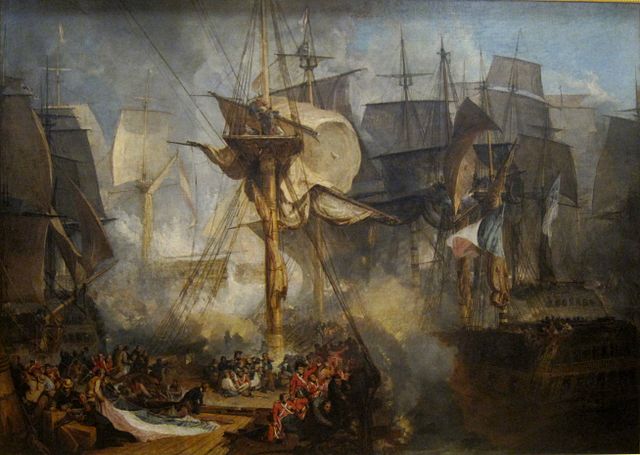*Image Credit: Wikimedia Commons Just as the rise of Napoleon began to affect the European continent, an infamous victory for the British navy on October 21, 1805 established dominance on the seas that would last for a century. Triumph at the Battle of Trafalgar meant a legacy of heroism for Admiral Horatio Nelson, as well as a shift in maritime tactics that altered warfare amongst large armadas forever. Since taking command of the French army in 1796, Napoleon Bonaparte had become nothing short of a force of nature when it came to ground combat. The British Royal Navy, on the other hand, had managed to swell during the 18th century into a battle group capable of defeating nearly anything thrown at it by ships from the continent — that is, assuming the British hadn’t made them allies by subsidizing their armies first. In 1802, after the War of the Second Coalition, France and Britain signed a tenuous peace accord at Amiens. It lasted just months. By the middle of 1803, Britain had gathered a Third Coalition and seized the initiative by lining the French coast with ships of the line in order to choke off the economy and prevent Napoleon from building a suitable navy from the collection of ships at his disposal and those of his Spanish allies. Furious and determined to put his men on the British mainland as soon as possible, the French general formulated a plan to break through the blockade and methodically clear the English Channel. Once secure, he would use superior numbers to protect his invasion force. Nelson had other ideas. Hoping to draw the French out into combat in the Mediterranean Sea, he sailed toward Egypt before realizing his counterpart, Vice Admiral Pierre-Charles Villeneuve, had made it through the Strait of Gibraltar to connect with Napoleon’s squadrons in the Caribbean. By mid-September 1805, the two navies were inching toward combat off the Cape of Trafalgar near Cadiz, Spain. Directed by Napoleon to sail to Naples and drop off soldiers to reinforce his armies in Italy, the combined French-Spanish force was at an impasse. After weeks of indecision, Villeneuve decided to launch his 33 ships of the line on October 18th in the midst of calm winds. Disjointed and having difficulty building speed, the French commander managed to pull his group into a loose three-column formation as they moved to the southeast — then came the worst-case scenario: the British Royal Navy was spotted in pursuit on October 20th. Unable to make up his mind on the posture to take, Villeneuve gave conflicting orders, first to form a single line and then to return to three columns before reversing his decision once again to settle on a long stretch in a bid to take advantage of the larger flotilla at his disposal. (Nelson commanded only 27 ships of the line, six fewer than Villeneuve.) Confused, the French and Spanish were strewn about the sea as an uneven mess. The British were quite the opposite. Early on the morning of October 21, 1805, Nelson had relayed his wishes to his fellow commanders and formed up a two-pronged attack. Violating traditional maritime strategy, Nelson had come up with a daring strategy to bring his two groups in against the enemy at a right angle in order to hide the fact he had fewer men and guns available. As the two fleets neared each other, Nelson ordered a simple message to be put in the flags across his masts: “England expects that every many will do his duty.” Sweeping in from the west, the British engaged the French and Spanish around noon. Within two hours, the sluggish navy under Villeneuve had been split and the battle had devolved into something akin to a street brawl. As Nelson’s men surrounded the rear and middle of the allied navy Napoleon had brought forth, the British inflicted heavy casualties, quickly capturing 22 vessels without suffering a single loss. Nelson, lying below deck on the HMS Victory after taking a bullet, faded away after ordering the ships to anchor in advance of a coming storm, reportedly saying “Thank God I have done my duty.” Hailed in his home country after his death, Nelson’s daring victory — coupled with the United Kingdom’s vast wealth during the 19th century — positioned the British Navy as the preeminent European sea power until the onset of World War I. Also On This Day: 1097 – The Siege of Antioch in the First Crusade begins 1520 – Ferdinand Magellan navigates around the southern edge of South America, discovering what is now known as the Strait of Magellan 1854 – Florence Nightingale and 38 other nurses are deployed in the Crimean War 1931 – Nationalist soldiers in the Imperial Japanese Army, known as the Sakurakai, launch an unsuccessful coup d’etat 1959 – The Solomon R. Guggenheim Museum, designed by Frank Lloyd Wright, opens in New York City
October 21 1805 CE – The British Claim Victory at the Battle of Trafalgar
*Image Credit: Wikimedia Commons Just as the rise of Napoleon began to affect the European continent, an infamous victory for the British navy on October 21, 1805 established dominance on…
427
